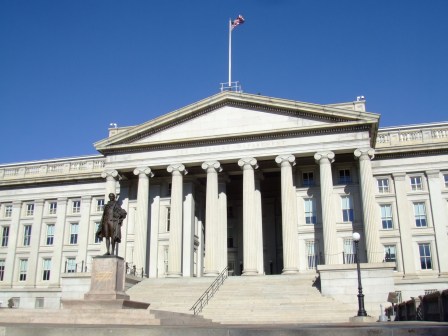Apple Pay’s newest customer: the federal government
Apple CEO Tim Cook revealed Friday that the U.S. government will begin using Apple’s mobile payment systems for federal government transactions.
Speaking at a White House-orchestrated summit on cybersecurity at Stanford University, Cook said the government would permit consumers to make payments and receive benefits using Apple’s mobile payment technology, beginning in September.
The arrangement will also allow federal employees to make government purchases using the mobile payment system, through the General Service Administration’s SmartPay program. The program processes more than 87.4 million transactions valued at $26.4 billion a year, according to the GSA and
reported by Bloomberg Business.
The Obama administration released word of the announcement ahead of Cook’s speech Friday at the
cybersecurity summit in Palo Alto, California. Cook made the announcement during remarks at the summit where he spoke about the importance of preserving the privacy and security of consumers’ data.
“We shouldn’t have to trade security for the convenience of having information at our fingertips,” Cook said. At the same time, he stressed the fundamental responsibilities companies and institutions have in protecting the privacy and security of consumers’ personal data.
“If those of us in positions of responsibility fail to do everything in our power to protect the right of privacy, we risk something far more valuable than money,” he said. “We must get this right. History has shown us that sacrificing the right to privacy can have dire consequences.”
His remarks, and his assertion that Apple Inc. refuses to make commercial use of the personal data transmitted via Apple products, stood at odds with business models used by other companies flourishing in the digital economy, including Facebook and Google, which he did not name and whose CEOs did not attend the event.
Apple updated its privacy policy last September prior to the launch of its iPhone 6 and 6 Plus smartphones, and the debut shortly thereafter of its mobile Apple Pay system, which uses near-field communications technology on the phones.
Under those new policy provisions, Apple said the company would no longer be able to access the data stored on mobile devices using Apple’s iOS 8 operating system. The policy, however, quickly drew criticism from FBI and law enforcement officials who said the decision, and similar moves by Google to encrypt personal data on mobile devices, will make it much harder for law enforcement and counterterrorism agents to do their jobs.
Apple’s payment system does not actually transmit the credit or debit card information of users. Instead, it works with major banks and credit card companies, including MasterCard, to create a unique, single-instance digital token that preserves users’ identity and the security of transactions between consumers, merchants and their banks.
Apple’s announcement was one of several expected Friday from companies planning to introduce new measures to make consumer financial transactions more secure, according to a White House
briefing document released in conjunction with the cybersecurity event. The document said:
- Visa is committing to tokenization – substituting credit card numbers with randomly generated tokens for each transaction – by the end of the 1st quarter of 2015.
- MasterCard will invest more than $20 million in new cybersecurity tools, including the deployment of Safety Net, a new security solution that will reduce the risk of large-scale cyber attacks.
- Apple, Visa, MasterCard, Comerica Bank and U.S. Bank are committed to working together to make Apple Pay, a tokenized, encrypted service, available for users of federal payment cards, including DirectExpress and GSA SmartPay cards.
- Square is working with the Small Business Administration to roll out an education program aimed at convincing small business to adopt more secure payment technologies.
- The Financial Services Roundtable and the Retail Industry Leaders Association, on behalf of a partnership of 19 associations, are jointly announcing today the release of two papers to enhance collaboration in the development of technology standards and principles for the development of next generation technologies that minimize the value of payments information if it is stolen or lost.




